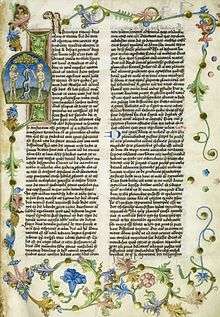Antiquities of the Jews

Antiquities of the Jews (Greek: Ἰουδαϊκὴ ἀρχαιολογία, Ioudaikē archaiologia; Latin: Antiquitates Judaicae), also Judean Antiquities (see Ioudaios), is a 20-volume historiographical work composed by the Jewish historian Flavius Josephus in the 13th year of the reign of Roman emperor Flavius Domitian which was around AD 93 or 94.[1] Antiquities of the Jews contains an account of history of the Jewish people, written in Greek for Josephus' gentile patrons. In the first ten volumes, Josephus follows the events of the historical books of the Hebrew Bible beginning with the creation of Adam and Eve. The second ten volumes continue the history of the Jewish people beyond the biblical text and up to the Jewish War.
This work, along with Josephus's other major work, The Jewish War (De Bello Iudaico), provides valuable background material to historians wishing to understand 1st-century AD Judaism and the early Christian period.[2]
Content
In the preface of Antiquities of the Jews, Josephus provides his motivation for composing such a large work. He writes:
Now I have undertaken the present work, as thinking it will appear to all the Greeks worthy of their study; for it will contain all our antiquities, and the constitution of our government, as interpreted out of the Hebrew Scriptures.[3]
Josephan scholar Louis Feldman highlights several of the misconceptions about the Jewish people that were being circulated in Josephus' time. In particular, the Jews were thought to lack great historical figures and a credible history of their people. They were also accused of harboring hostility toward non-Jews, and were thought to be generally lacking in loyalty, respect for authority, and charity.[4] With these harsh accusations against the Jews fluttering about the Roman empire, Josephus, formerly Joseph ben Matthias, set out to provide a Hellenized version of the Jewish history. Such a work is often called an "apologia," as it pleads the case of a group of people or set of beliefs to a larger audience.
In order to accomplish this goal, Josephus omitted certain accounts in the Jewish narrative and even added a Hellenistic "glaze" to his work. For example, the "Song of the Sea" sung by Moses and the people of Israel after their deliverance at the Red Sea is completely omitted in Josephus' text.[5] He does mention, however, that Moses composed a song to God in hexameter—a rather unusual (and Greek) metrical scheme for an ancient Hebrew.[6] Josephus also writes that Abraham taught science to the Egyptians, who in turn taught the Greeks, and that Moses set up a senatorial priestly aristocracy, which like Rome resisted monarchy. Thus, in an attempt to make the Jewish history more palatable to his Greco-Roman audience, the great figures of the biblical stories are presented as ideal philosopher-leaders.
In another example, apparently due to his concern with pagan antisemitism, Josephus omitted the entire episode of the golden calf from his account of the Israelites at Mount Sinai. It has been suggested that he was afraid that the biblical account might be employed by Alexandrian antisemites to lend credence to their allegation that the Jews worshiped an ass's head in the Temple (cf. Apion 2:80, 114, 120; Tacitus, Histories 5:4).[7]
Josephus' Judean Antiquities is a vital source for the history of the Intertestamental period and the Jewish war against Rome.[1]
Josephus also adds a short account of his personal life, Vita, as an appendix to the Judean Antiquities.
Manuscripts
The extant copies of this work, which all derive from Christian sources (even the recently recovered Arabic version), contain two disputed passages about Jesus. The long one has come to be known as the Testimonium Flavianum. If genuine, it is an early extrabiblical record of Jesus, and as such is sometimes cited as independent evidence for the historical existence of Jesus. The earliest complete Greek manuscript of the Antiquities dates from the eleventh century,[8] the Ambrosianus 370 (F 128); preserved in the Biblioteca Ambrosiana in Milan.
Translations
One of the best known translations of this work was provided by William Whiston in 1737, which has been in print continuously since then.[9] However, the Loeb Classical Library has a more recent translation by Henry St. John Thackeray and Ralph Marcus, normally preferred academically. A cross-reference apparatus for the Works of Josephus and the Biblical canon also exists.[10][11]
See also
References
- 1 2 Freedman, David Noel, ed., The Anchor Bible Dictionary, (New York: Doubleday, 1997, 1992).
- ↑ Stephen L. Harris, Understanding the Bible, (Palo Alto: Mayfield, 1985).
- ↑ Ant. 1.5. Trans. by William Whiston, A.M., 1895
- ↑ Louis Feldman, Josephus’ Interpretation of the Bible (Berkeley: University of California, 1998), pp. 132-162.
- ↑ Exodus 15
- ↑ Ant. 2:346
- ↑ https://www.jewishvirtuallibrary.org/jsource/judaica/ejud_0002_0007_0_07514.html
- ↑ Clare K. Rothschild, "Echo of a Whisper": The Uncertain Authenticity of Josephus' Witness to John the Baptist, in David Hellholm, Tor Vegge, Ayvind Norderval, Christer Hellholm (editors), Ablution, Initiation, and Baptism: Late Antiquity, Early Judaism, and Early Christianity, page 273 (Berlin/Boston: Walter de Gruyter, 2011). ISBN 978-3-11-024751-0
- ↑ A new updated version of Whiston's translation was published by Hendrickson Publishers in 1987.
- ↑ Clontz, T.E. and J., "The Comprehensive New Testament", Cornerstone Publications (2008), ISBN 978-0-9778737-1-5
- ↑
External links
| Wikisource has original text related to this article: |
- Whiston translation of Antiquities of the Jews
- Loeb Classical Library Josephus Volume 4 Antiquities of the Jews Books 1-4
- Loeb Classical Library Josephus Volume 5 Antiquities of the Jews Books 5-8
- Loeb Classical Library Josephus Volume 6 Antiquities of the Jews Books 9-11
- Loeb Classical Library Josephus Volume 7 Antiquities of the Jews Books 12-14
- Greek and English
- Antiquities of the Jews at Project Gutenberg
-
 The Antiquities of the Jews public domain audiobook at LibriVox
The Antiquities of the Jews public domain audiobook at LibriVox